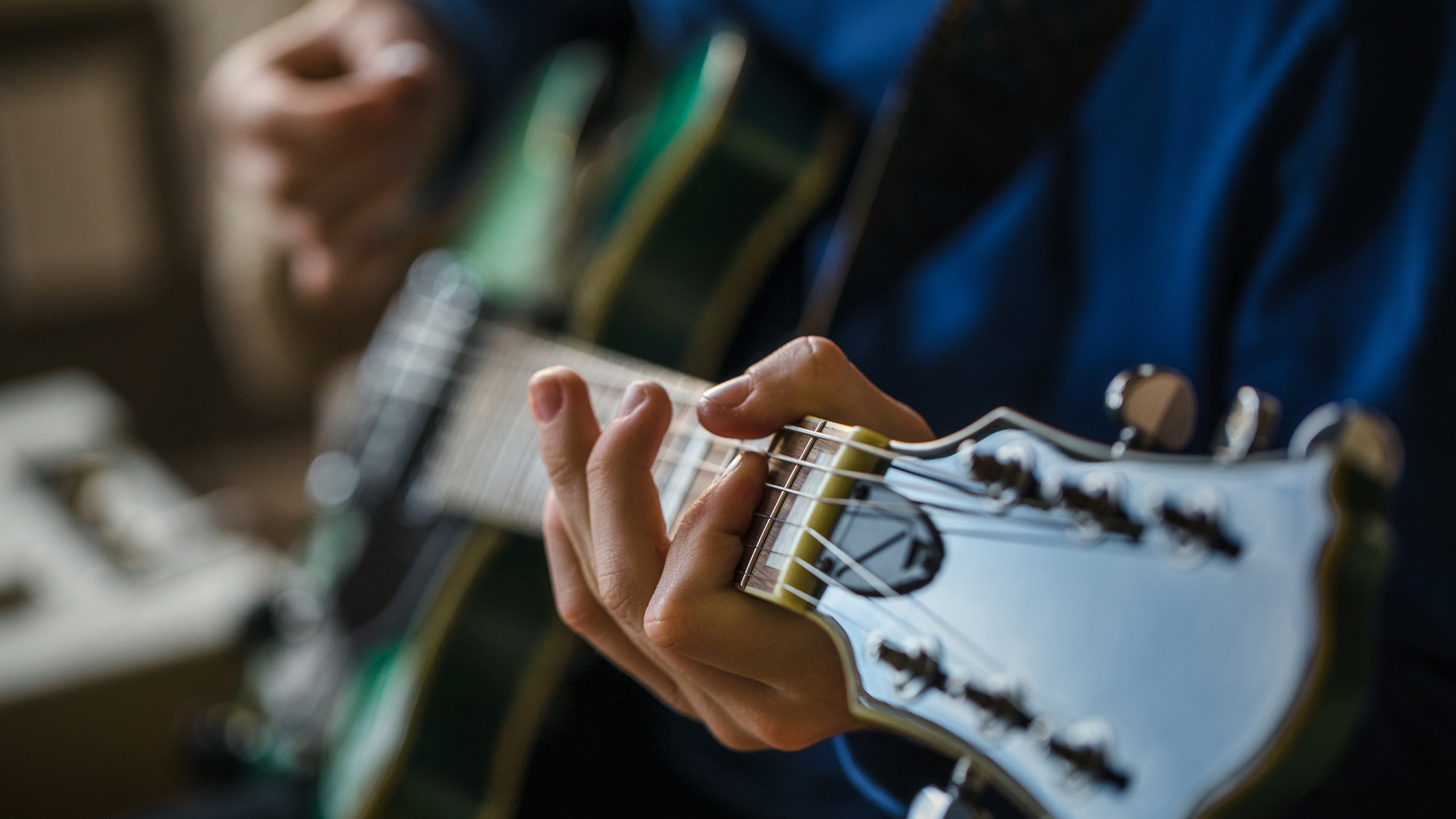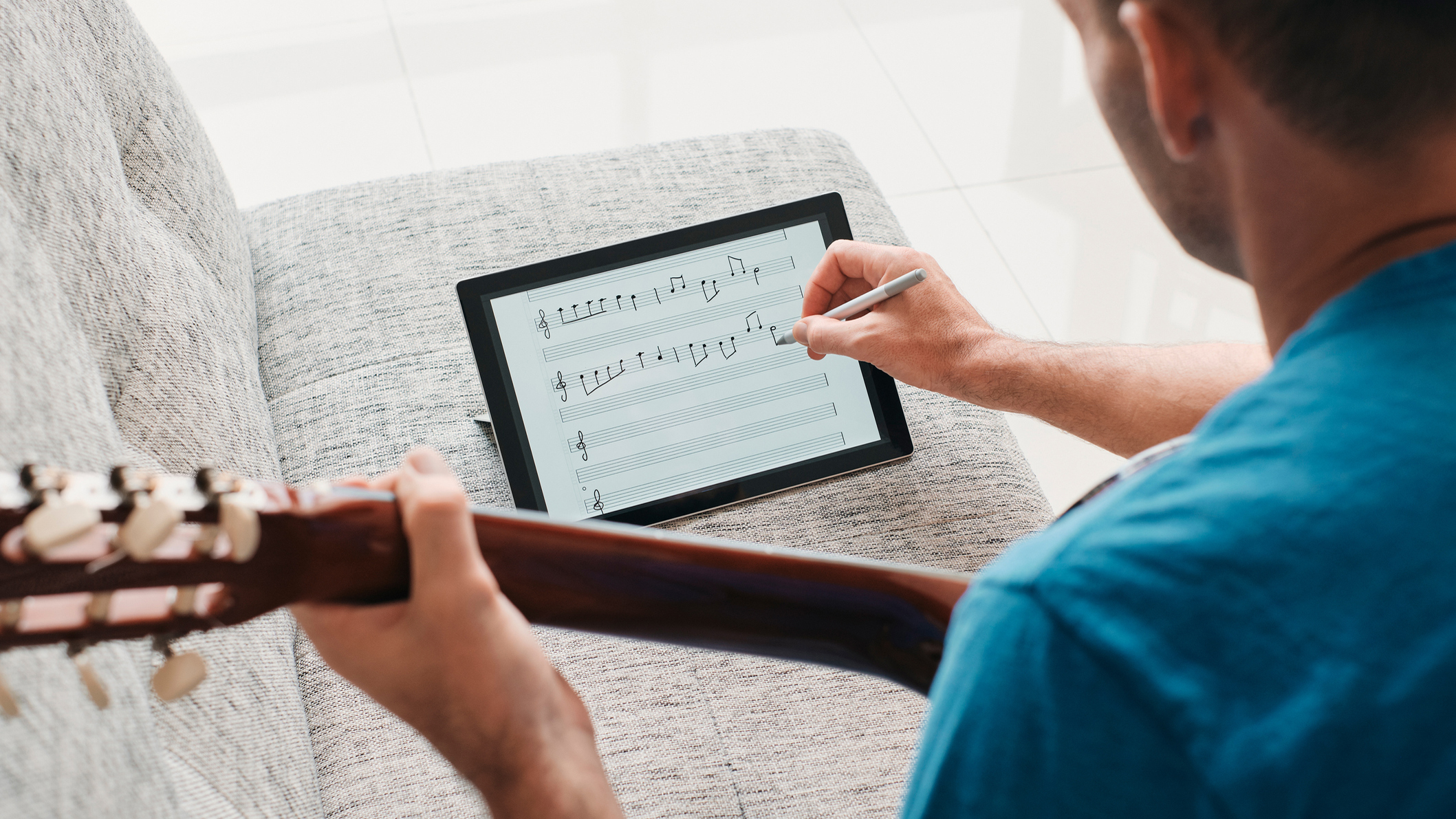How To Play He Never Left Me On Guitar
Is guitar easy to learn? We ask a musician and teacher for his opinion.

Thinking of picking up the guitar? Well, you're definitely not alone, as it's one of the most popular instruments in the world. And with a huge amount of online learning material available, it's never been easier to grab an acoustic and start strumming away. We even have a handy round-up of the best guitar lessons online, if you're in the market for some virtual lessons.
But is guitar easy to learn? That depends on what you're comparing it to. It's easier to master than the accordion, but it's not as easy as learning to play the piano. We checked in with James Schofield, a guitar school owner with 15 years' experience, who teaches classes online and in person. He enlightened us on exactly how difficult it is to learn guitar, where you should start with classes, and whether or not you need in-person lessons when learning.
Why learn guitar in the first place?
Learning an instrument has been found to not only increase your IQ, but has also been linked with better academic performance. As with any other challenging activity – such as learning to code or picking up a second language – learning an instrument like the guitar gives the brain a connective advantage, and the earlier you start, the better this gets.
All of the above is all good and well, but the most important aspect of learning guitar is that it's a fun new skill to try. James adds: "Guitar is challenging for sure, but very rewarding. It's actually really useful if you learn more than one instrument as you pick up lots of transferable skills!"
So, anyone who decides to put in some time with online piano lessons, may find it easier to master the guitar as well.

How long does it take to master guitar?
There tend to be a few more hurdles initially when learning the guitar, when compared to, say, learning the drums or piano. This is because to start you have to build up calluses in your fingertips and be able to move comfortably between chords.
When it comes to how long it takes to master a few chords on the instrument, James says it varies from pupil to pupil, and is generally based on practice time. "All pupils have a few hurdles to get over initially – for example, at first their fingers may be a little sore. I always recommend 20 minute practice sessions to start with, at regular intervals."
After three to six months, though, you should have the basics down, depending on how many hours you're spending each day practicing.
Is it harder for adults to learn guitar?
James thinks not. He says: "A lot of progress comes down to attitude and discipline. I've had 12 year olds that are more disciplined than some of my adult pupils, but on the flip side of that adults are normally paying for their own lessons so they tend to practice more on the whole and put more time and energy in. It varies from pupil to pupil. It's never too late to learn!"
What are the different styles of guitar playing?
There are so many different techniques and methods that apply to different genres, but there are a few that apply to all of them, such as sight reading and music theory.
"Fingerpicking applies more so to classical music but is also found in a lot of contemporary rock and pop music. Metal has its own nuances and this also applies to other genres such as jazz. The majority of my pupils tend to be into rock and pop music, where strumming, chords, theory and scale knowledge tend to be prioritised," explains James.

How easy is it to learn online versus in person?
While online learning is usually best when complemented by in-person learning, it is possible to learn the guitar online. For this, structured courses are best. While YouTube is great for resources, it's not always best for a beginner as there isn't as much structure as you'd need. Plus, with a platform as big as that you can end up going down a rabbit hole of different content and spend hours watching videos without actually learning anything useful.
James was hosting one-on-one piano Zoom classes throughout the pandemic and still occasionally does so now. He says it has some drawbacks – like dodgy internet connections playing havoc with the class – but it is possible to have very productive lessons on Zoom – especially when teaching pupils across the world – particularly because of the ability to give feedback straight away. His preference for local pupils, though, is face-to-face sessions.

While it's lovely to share a physical space with a tutor and have that weekly or monthly commitment to see them, the pandemic has made in-person tuition much harder, and online learning has become a convenient alternative. Using some of the best online learning platforms can help you feel committed and encourage regular playing, with chord charts, feedback available on certain courses and progress being easy to track. A lot of these platforms offer free trials so you can get a taster for it before committing – but with online learning you're in the driving seat, and so there may be a feeling of less accountability as there's nobody to prod you to practice, practice, practice. James stresses the importance of regular feedback when learning, so if you're learning online try to find a platform that offers this facility.
Ultimately, it's important to remember that you'll get out what you put in. So if you schedule a time each day to dedicate to your guitar learning journey, you'll likely be more successful. Even a few minutes each day is better than a few long hours on the weekend. This is because a lot of it is down to muscle memory and consistency – repetition is key to start you on the right path. With online learning you'll need to find the motivation to keep it up!
What are the best ways to start learning?
First off, get a good acoustic or electric guitar. While it doesn't have to break the bank, make sure it's of a semi-good quality. James says: "If the guitar is really cheap it can actually often hinder progress. For example, a lot of cheaper acoustic guitars are actually classical guitars with a wide neck. Even though the strings are easier on the fingers, for a child the wide neck isn't helpful. It can also be harder to keep a cheaper guitar well tuned. There are great 3/4 size guitars for kids nowadays. Fender, Yamaha and Ibanez have some great full size acoustic and electric guitars for adults and teenagers."
Get lessons! James says: "There are some good online lessons available – but bad online guitar lessons can mean you pick up bad habits quickly. I have a YouTube channel, and there are other good channels out there such as Justin Guitar, Andy Guitar and Marty Guitar. Apps and YouTube are great to complement one-to-one lessons.
"Start off with beginner guitar chords, then moving between them, then basic strumming. After that, start with some beginner guitar songs such as Stand By Me by Ben E. King!" Why not set a goal to learn a new song every month?

Kavi Shah is an experienced freelance writer and editor who covers various topics for Top Ten Reviews, including photography, education and languages.
How To Play He Never Left Me On Guitar
Source: https://www.toptenreviews.com/is-guitar-easy-to-learn-and-can-anyone-learn-to-play
Posted by: chamblisswaregs.blogspot.com

0 Response to "How To Play He Never Left Me On Guitar"
Post a Comment